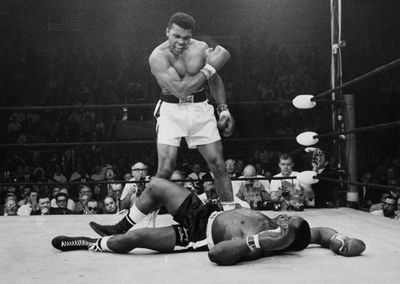UnNews:UnNews remembers Muhammad Ali
Sunday, June 5, 2016

The world has lost yet another legend in the year 2016. Boxing legend, civil rights activist, and all-around nice guy Muhammad Ali - "The Greatest" - has left the ring. He was 74.
Born Cassius Marcellus Clay Jr. in Louisville, he first started boxing at the age of 12 when somebody stole his bike. At 18, after winning several championships, he won a Gold Medal as a light heavyweight at the 1960 Rome Olympics, defeating a Polish veteran. Even so, when he returned home, a Louisville restaurant refused to serve a black man. Legend has it that the boxer threw his medal into the river. Whatever became of that medal, Ali received a placement in 1996, the year he lit the cauldron for the Atlanta Olympics.
After the 1960 Olypmics, Cassius Clay turned pro, winning 19 consecutive fights. "The Louisville Lip" was known for making rhymes to predict when his opponents would fall. His first heavyweight fight was against Sonny Liston in 1964. In the lead-up to this legendary fight, Clay uttered his most famous words, "Float like a butterfly, sting like a bee." Clay would ultimately defeat Liston in seven rounds, despite the 7-1 odds against him.
The next day, Clay announced that he had joined Islam and was changing his name to Cassius X. Like Malcolm X, the X is used to denote that one's last name and family have been taken away from you by slave owners. A year later, he took the name Muhammad Ali. One of the few sportscasters to start referring to Ali by his new name was Howard Cosell.
Many people scorned the name change and his ties to Islam. Things got even worse in 1966 when Ali refused to serve in Vietnam due to his Islamic pacifist beliefs.
"I ain't got no quarrel with them Viet Cong," Ali said of his refusal. "No Viet Cong ever called me n----r."
Before a 1967 fight, opponent Ernie Terrell referred to Ali by his birth name; Ali was furious. "What's my name?" He also knocked out Zora Folley a month later. Due to dodging the draft, Ali was stripped of his title, passport, and boxing licenses. He was looking at five years in prison for draft evasion. Ali lost several endorsement deals during this controversy.
In 1970, people finally realized that Ali was right about Vietnam and a judge allowed him to once again box professionally. But by this point, Ali's skills had started to diminish; he defeated Jerry Quarry, but it took 15 rounds to defeat Oscar Bonavena and reclaim his heavyweight title.
In 1971, Ali's third match against Joe Frazier was dubbed "The Fight of the Century." Both Ali and Frazier were guaranteed $2.5 million, a record salary at that time. Approximately 300 million people tuned in to watch Ali and Frazier clobber each other. The match started well, but by the 15 round, Frazier had floored Ali with a left hook, only the third time Ali had been knocked down. After 32 fights, this was Ali's first loss.
Months after the Frazier loss, The U.S. Supreme Court had granted Ali amnesty for evading the Vietnam draft. This meant he didn't have to go to prison. Ali shifted toward Sunni Islam, rather than The Nation of Islam.
In 1974, Ali won in a rematch against Frazier, one of the most memorable events in sports history.
That same year, Ali faced off against George Foreman in the "Rumble in the Jungle" in Zaire, Africa. Troll-haired boxing promoter Don King struck a deal with the Zaire government to guarantee the two champs an unheard-of $10 million. Ali reprised his "fight like a butterfly, sting like a bee" quote. Ali famously let Foreman clobber him, and just when he got tired enough, Ali threw a punch.
In 1975, after 24 rounds, Ali defeated Frazier yet again in the "Thrilla in Manilla" fight in The Philippines.
Ali ultimately retired from the ring in 1981 -- 56 wins, 5 losses. Around this time, Ali was diagnosed with Parkinson's Disease. Ali used his retirement to promote peace. He was able to convince Saddam Hussein to release more than a dozen American hostages in 1990, shortly before the Gulf War. Ali was nominated for a Nobel Peace Prize in 1997. A year later, he was named a U.N. Messenger of Peace.
One of Ali's last triumphs was the construction of the Muhammad Ali Center, a state-of-the-art museum chronicling his life and promoting peace worldwide. It opened in 2005 in Louisville.
This is a huge one to take in, huge. I mean HUGE. Ali was a legend in and out of the ring. 2016 has been a brutal year for celebrity deaths. We've had at least one every month this year.
- December 2015: Lemmy, Natalie Cole
- January: David Bowie, Alan Rickman, Glenn Frey, Abe Vigoda
- February: Maurice White (Earth, Wind, and Fire), Vanity (Prince), Harper Lee, George Kennedy
- March: Nancy Reagan,
Paul Ryan (whoops, make that comic book artist Paul Ryan!), George Martin, Keith Emerson, Frank Sinatra, Jr., Garry Shandling, Patty Duke - April: Merle Haggard, Doris Roberts, Prince, Billy Paul ("Me and Mrs. Jones")
- May: Tupac's mother, Alan Young, Nick Menza (Megadeth drummer)
- June: Muhammad Ali
Enough is enough. 2016, please stop killing all the greats! My heart can't take any more celebrity deaths. Take Donald Trump, please. But I beg of you, let the legends live on.
Muhammad Ali. 1942 - 2016. Rest in peace.
Sources[edit | edit source]
- Steve Almasy "Boxing legend Muhammad Ali was "The Greatest" to a world of fans" CNN, June 24, 2016